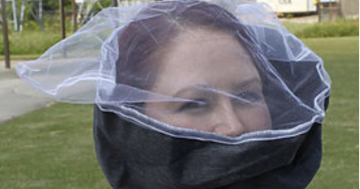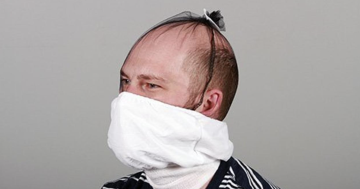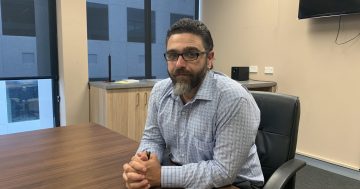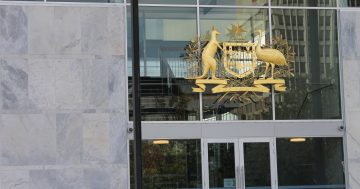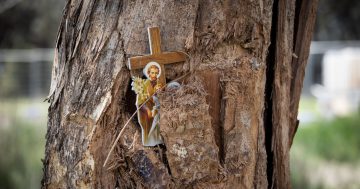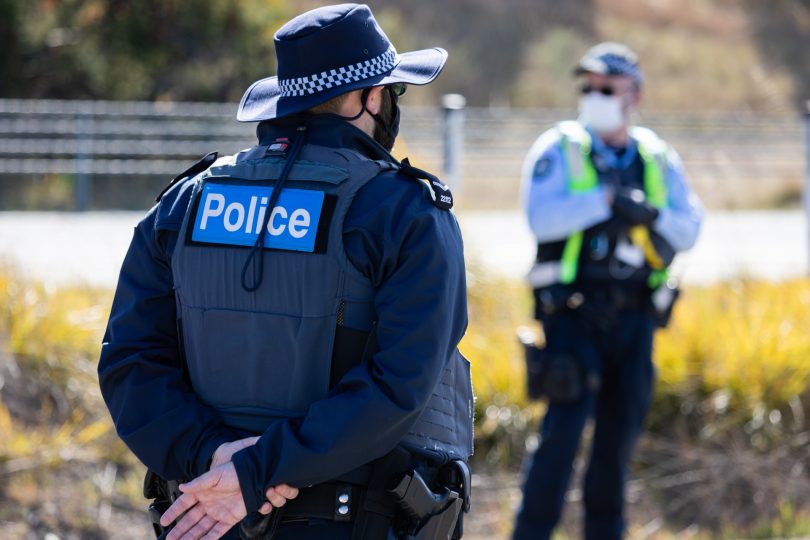
Police officers have shared exactly what it entails to be spat at on the job following discussions of a ban on spit hoods this week. Photo: Michelle Kroll.
Six months of blood tests while waiting to determine if you’ve contracted a disease.
Half a year of uncertainty, anxiety and stress while waiting to find out whether you could be at risk of passing on a disease to your loved ones.
That’s the reality for police officers who are spat at. And the “abhorrent act” of spitting at police is not as rare as you might think.
In the 18 months between March 2020 and August 2021, 26 police officers reported being spat at or bitten in the course of their duties. Offenders have been known to bite the inside of their mouths so they can spit blood at the arresting officer.
In 2009, former AFP officer Jason Taylor arrested an offender. It was a pretty routine day on the job.
But the offender had a face covered in blood when he decided to spit in Jason’s face.
“He then gleefully informed me he had Hepatitis C,” he said.
“Six months of blood tests to ensure I didn’t have anything. The stress was immense.”
Mr Taylor was one of several police officers who shared their stories with Region – many on the condition of anonymity – following calls earlier this week for a ban on spit hoods from the ACT Greens and the Human Rights Commission.
Graham* has a similar story.
During the arrest of a known recidivist offender on breach of bail, who was officially confirmed as positive for hepatitis, Graham was spat at.
“He coughed up the biggest phlegm ball and spat it directly in my face. A large amount of it ended up in my mouth and eyes,” he said.
“Given the fact he was known to have the disease, it led to six months of health uncertainty which had a large impact on my mental health. It also affected my relationship with my partner at the time.”
Graham said he worried every single day for six months that he had caught a disease.
“The ACT Greens should be ashamed. They wouldn’t know the trauma of having to have regular blood tests to find out if your life expectancy has been shortened … or the fear that if you intimately touch your partner you may transmit a disease.
“They weren’t there for those discussions and tears.”
Graham acknowledged the expert advice that hepatitis C is not transmitted via spit, but he also wagered the ACT Greens wouldn’t be game enough to line up to be spat at by people with hepatitis as part of a science experiment.
Earlier this week, it was revealed in estimates hearings police officers had used a spit hood on a 16-year-old girl who became violent after refusing to give up her alcohol in the city.
Chief Police Officer Neil Gaughan took on notice to find out how many times spit hoods had been used. He said that data was not readily available as using a spit hood wasn’t recorded in a separate category from the use of other restraints.
The devices are used at the ACT Watchhouse and can be used by police officers on the beat. They are not used at Bimberi Youth Justice Centre or the prison.
CPO Gaughan told the hearing the hoods, which are placed over a detainee’s head to stop them from spitting or biting, are safe as long as they are used correctly.
But the ACT Greens, the Human Rights Commission and First Nations advocacy group Change the Record disagree. They’ve called for alternatives like face shields to be used instead.
Greens spokesperson for police Andrew Braddock hopes to bring debate on a ban to the Assembly before the end of this year.
South Australia became the first state to ban spit hoods last year after a device was implicated in the death of Aboriginal man Wayne ‘Fella’ Morrison while in custody in 2016.
The police union has come out swinging against the calls for a ban and has accused the HRC of helping to politicise the issue.
“It is easy for them to criticise from the safety and comfort of their airconditioned offices – I would encourage the HRC executives to spend an entire week in a police car,” Australian Federal Police Association (AFPA) president Alex Caruana said.
“Go from job to job with [the police] and see how professional they are when they are dealing with their own safety and human rights being infringed on, while at the same time putting their bodies and lives on the line to keep the rest of the community safe.”
A spokesperson for the government said it supports the safety of police officers and the public.












